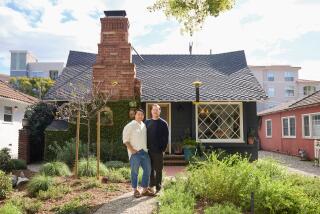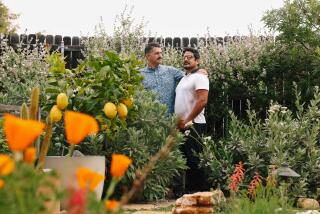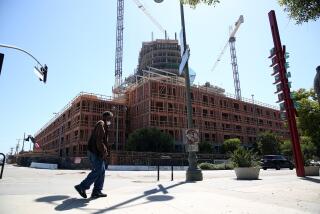Luxury developers are painting the town green to cater to the eco-conscious
Real estate developers are seeing green.
Responding to interest among home buyers for eco-friendly dwellings, developers are building energy- and water-efficient features into homes, reusing materials instead of buying new ones and purchasing bicycles for residents to use.
They’re also catering to residents who are demanding filtered air and water, nontoxic paints and adhesives, and fixtures such as low-flow shower heads.
“To be eco-friendly is now expected,” said Hans Galland, senior vice president of development for Pacific Eagle, which is developing the 68-unit Cavalleri condominium complex in Malibu. “In the luxury space, sustainability is becoming part of a more holistic way to live, a lifestyle statement more than having another crystal chandelier.”
Cavalleri, scheduled to be completed early next year, is reusing the Spanish tile rooftops from the previous property that was on the site. Landscaping around the property will incorporate drought-resistant plants such as crape myrtle and California pepper trees.
“The renovation is a sustainable effort and an adaptive use of the existing property,” Galland said. “We’re tearing down selectively, focusing on recycling and upgrading.”
Building eco-friendlier spaces, experts say, doesn’t have to be more expensive than traditional construction.
“Builders can achieve very aggressive green goals at close to market-rate construction prices,” said Scott Nyborg, sustainability manager at Allen Construction, which specializes in green homes and commercial projects. “The bump in home value overwhelms any nominal increase in construction costs to build green.”
Developers are also thinking of creative ways to get residents moving — without using their cars.
At AIRE in Santa Monica, a development of 19 homes that will be ready for occupancy early next year, two bicycles are included with each unit. A bike room is provided on-site for tuneups.
The units, which start at $900,000, will be surrounded by low-water plants. A green wall on the property will be covered with succulents. And the decks are being constructed from a material that looks like wood but is made primarily from pressed rice husk, said Ken Simpson, project director at Palisades, AIRE’s developer.
“Building green doesn’t necessarily cost more, particularly when these strategies are integrated into the development process right from the start,” he said.
Bikes are also part of the plan at the upcoming Beverly Hills apartment building, Ten Thousand, with units starting at $9,000 a month. The high-rise will offer electric bikes that residents can use free.
It also plans to harvest rainwater, to be used for more than 100 trees being planted in a one-acre park on-site, said Roman Speron, vice president for Crescent Heights, the developer of Ten Thousand.
At Brookfield Residential’s expanding Playa Vista development, new additions to the community adhere to the same eco-conscious principles as the existing homes’, said Alison Girard, the company’s director of marketing.
The new homes are LEED-certified; the fitness center was built with large windows, which allows the building to be cooled without air-conditioning. Girard estimates that a LEED-Platinum certified home can add up to $30,000 to the value of a property.
Helen Park, who recently purchased a 2,500-square-foot house in Playa Vista, said she was drawn to its sustainable attributes. Although the cost was “a little higher” than expected, it was an investment she and her husband were willing to make.
“I’m in the tech business, so I always look for progressive and new innovation,” said Park, the CEO of tech talent firm UXTalent. “I like the solar panels so we can conserve energy and avoid waste, and that the dog parks have dirt instead of grass, to cut down on watering.”
Not all buyers are willing to pay more to live green. Because of that, some developers have been reluctant to get on board.
“Most consumers would prefer environmentally well-designed residences,” said Paul Zeger, partner at real estate firm Polaris Pacific. “But we have seen it more as a marketing advantage versus an investment that generates a meaningful return on investment. Consumers want green but have not yet been willing to pay a meaningful premium for it.”






